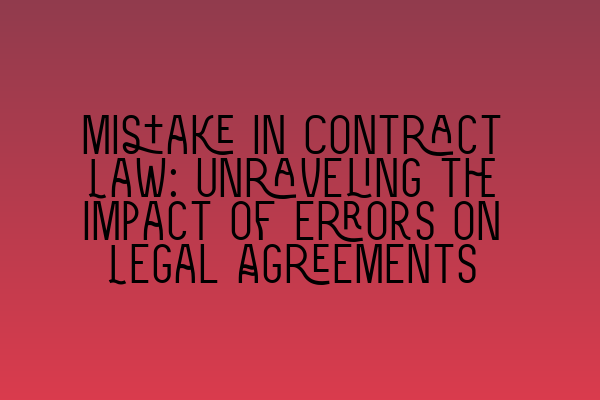Mistake in Contract Law: Unraveling the Impact of Errors on Legal Agreements
Contracts form the backbone of business transactions and legal agreements. They are carefully crafted, binding documents that outline the rights and obligations of parties involved. However, what happens when mistakes are made in a contract? How do these errors impact the enforceability of the agreement? In this blog post, we will delve into the world of contract law to explore the intricacies of mistakes and their implications.
One of the most common forms of mistake in contract law is called a mutual mistake. This occurs when both parties to a contract are mistaken about a fundamental fact. For example, imagine two parties enter into an agreement to purchase a vintage car, believing it to be in good working condition. However, after the contract is signed, it is discovered that the car is actually a replica. In such cases, the contract can be declared void ab initio, meaning it is treated as if it never existed. This allows both parties to walk away from the agreement without any legal repercussions.
Another type of mistake that can impact the validity of a contract is a unilateral mistake. Unlike a mutual mistake, a unilateral mistake only affects one party to the agreement. For instance, if Party A mistakenly quotes an incorrect price for their services in a contract with Party B, Party B may choose to enforce the contract at the quoted price. However, if Party B was aware of Party A’s mistake or should have reasonably been aware of it, the contract may be voidable by Party A. In such cases, the mistaken party can seek to have the contract set aside.
It is important to note that not all mistakes create grounds for voiding or setting aside a contract. The mistake must be regarding a fundamental aspect of the contract that goes to the root of the agreement. For example, a mistake regarding a trivial detail or a foreseeable risk may not be enough to render the contract void.
In addition to mutual and unilateral mistakes, there is also the concept of a common mistake. This occurs when both parties are mistaken about the same fact, but it is not a fundamental aspect of the contract. In such cases, the courts may decide to uphold the contract and allow the parties to negotiate a new agreement to address the mistake.
Now that we have explored the different types of mistakes in contract law, let’s discuss the impact of these errors on legal agreements. When a contract is declared void or set aside due to a mistake, the parties are typically returned to their original positions before the contract was signed. This means that any money or property exchanged under the contract may need to be returned. However, there may be certain exceptions and limitations depending on the specific circumstances of the case.
As a solicitor specializing in contract law, it is crucial to assist clients in navigating the complex landscape of mistakes in contracts. This involves thorough analysis of the factual and legal aspects of the case, as well as understanding the precedents set by previous court decisions. By staying up to date with the latest developments in contract law, solicitors can provide their clients with accurate and reliable advice.
In conclusion, mistakes in contracts can have significant implications on legal agreements. Depending on the type of mistake and its impact on the fundamental aspects of the contract, the agreement may be void or voidable. It is essential for solicitors and legal professionals to have a comprehensive understanding of contract law in order to effectively represent their clients’ interests.
If you are preparing for the SQE exams or looking for additional resources to enhance your contract law knowledge, I recommend checking out the following articles:
– SQE 1 Practice Exam Questions: Test your contract law knowledge with a selection of practice questions to help you prepare for the SQE 1 exam.
– SQE 1 Practice Mocks FLK1 FLK2: These practice mocks are designed to simulate the real exam experience and assess your understanding of contract law.
– SQE 2 Preparation Courses: Explore comprehensive preparation courses specifically tailored to the SQE 2 exam, including modules on contract law.
– SQE 1 Preparation Courses: Enhance your understanding of contract law and other key areas through specialized preparation courses for the SQE 1 exam.
– SRA SQE Exam Dates: Stay updated on the upcoming exam dates for the SRA’s SQE exams, including the contract law component.
Remember, a thorough understanding of contract law and its intricacies is essential for solicitors and legal professionals. By staying informed and continuously honing your skills, you can confidently navigate the complexities of mistakes in contract law and provide the best possible representation for your clients.
